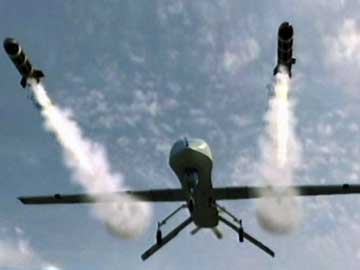
FGF E-Package
The Confederate Lawyer
March 22, 2013
If Lincoln Had Drones
by Charles G. Mills
fitzgerald griffin foundation

GLEN COVE, NY — Just think how much more effective Lincoln and his Reconstruction successors would have been if they had the benefit of missile-firing drones.
One of Lincoln's first projects was to suppress the State of Maryland. A majority of the members of the elected Maryland legislature favored seceding from the Union and joining the Confederacy. If they had been allowed to meet and vote, it might have made a significant difference in the war. Lincoln had the Army arrest and imprison enough Maryland legislators to prevent an ordinance of secession.
How much easier it would have been if Lincoln could have simply sent drones to kill the pro-secession legislators. An additional benefit would have been the absence of living victims to complain in later years about the violation of their rights under the Constitution. How much easier it would have been if Lincoln could have simply sent drones to kill the pro-secession legislators. An additional benefit would have been the absence of living victims to complain in later years about the violation of their rights under the Constitution. Early in the war, General Grant decided to expel the Jews from the military Department of the Tennessee (which included Kentucky). Although Kentucky was part of the Union and not at war with the North, this policy had the effect of driving many of Kentucky's Jews from their homes. How much simpler it would have been to simply send drones to kill them all and not create a class of unhappy nomads to complain about Grant's injustice.
The situation was somewhat similar along the Northern Bank of the Ohio River. The war never reached Ohio, Indiana, and Illinois, but the Northern Army arrested and imprisoned Southern sympathizers in these states. Only after the fighting ended was the Supreme Court able to rule that their imprisonment was illegal. If only Lincoln had drones, he could have avoided leaving anyone behind to be freed on a writ of habeas corpus.
As the Northern Army swept into Alabama, a liturgical dispute arose between the Northern commanding general and the Episcopal Bishop of Alabama. The general responded by closing all the Episcopal Churches in Alabama, effectively forcing the local Episcopalians to worship in private houses. How much more efficient it would have been simply to use a drone to assassinate the bishop.
After Lincoln was killed, elements in the Northern government stirred up hysteria about alleged co-conspirators. By order of a military tribunal, Mary Surratt and three men were hanged, and Dr. Samuel Mudd and others were imprisoned. Before long, Dr. Mudd embarrassed the North by his heroism in treating smallpox victims in his horrific military prison. Legal scholars generally believe that all of these alleged conspirators were entitled to jury trials, which the Army prevented. It would have been much neater if Andrew Johnson had made up a list of those guilty, in his opinion, of complicity in Lincoln's death and sent drones to kill them. Nobody would have been embarrassed when Dr. Mudd later displayed his heroic character.
For about 10 years after the war, the Northern Army controlled and manipulated the elections in South Carolina, Louisiana, Mississippi, and Florida; a national Republican majority was maintained by military force. This situation was ended by popular uprisings in these four states, which the Northern Army failed to put down. With a sufficient number of lethal drones, enough Democrats could have been killed to preserve the Republican monopoly of power.
The North did not hesitate to arrest legislators and dissidents, imprison them without trial, trample on the rights of Jews and Episcopalians, and hang men and women without due process. If drones had existed, the North would not have hesitated to use them.The Confederate Lawyer archives
The Confederate Lawyer column is copyright © 2013 by Charles G. Mills and the Fitzgerald Griffin Foundation, www.fgfBooks.com. All rights reserved.
This column may be forwarded, posted, or published if credit is given to Charles Mills and fgfBooks.com.
Charles G. Mills is the Judge Advocate or general counsel for the New York State American Legion. He has forty years of experience in many trial and appellate courts and has published several articles about the law.
See his biographical sketch and additional columns here.
To sponsor the FGF E-Package, please send a tax-deductible donation to the:
Fitzgerald Griffin Foundation
344 Maple Avenue West, #281
Vienna, VA 22180
1-877-726-0058
publishing@fgfbooks.com
or donate online.
@ 2025 Fitzgerald Griffin Foundation